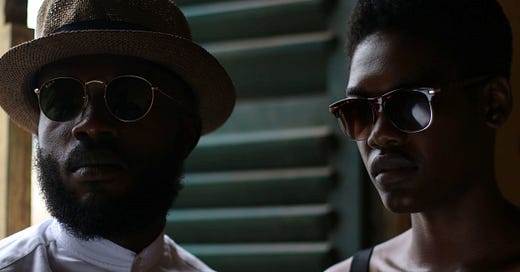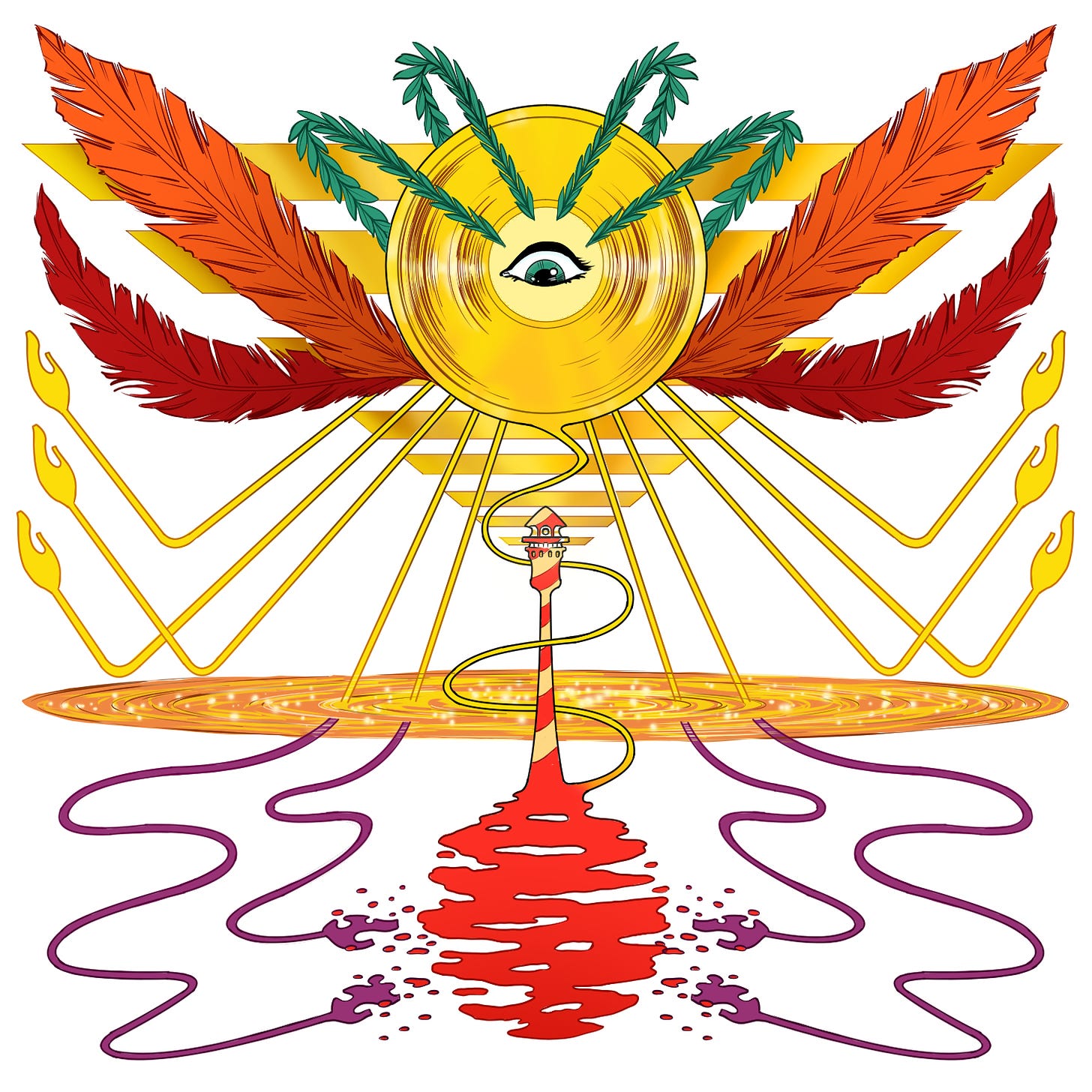If April is the foolish month, here’s a tri-horned cap and bells to shake in the face of cruelty, rot.
Laughter in Brackets
If there’s no answer to make for the sheer stupid insult of an intolerable reality: [laughter]. That is, bracketed laughter, after the joke, aside from the joke - after all, all life jokes are practical jokes.
Ridiculosity is one thing, but then: bracketed laughter - that’s outside the text, above and beyond any attempted peremptory text, and overtakes the text, a surtext roar.
Passage from my forthcoming The Killing Joke:
In 1929, a public spectacle was held for a debate between W.E.B DuBois and white supremacist Lothrop Stoddard on the question of the possibility of cultural equality between the races. Tellingly, here, basic sense and reality, the glare of self-evidence and experience has its day. Stoddard makes the claim that in Jim Crow America separate is equal, and enlightened Southern white men make sure that the separate schools for negroes are good schools and that the separate train accommodations for negroes are good accommodations. For crowd response, the debate transcripts record merely, in brackets: “laughter.”
Simply: [laughter]
Hidden in a single bracketed word, triumph – uproarious for DuBois and laughing Stoddard off the stage. Such is the needed laughter to spit in the face of absurdity, to overcome the ever-spying Lie gauging uncertainty, anti-Truth ready to wedge any opening in the ground. Stoddard the laughingstock. Clear reality contradicted? Answer with surpassing laughter.
Good Actors
The way you deliver a line can determine whether you’re doing poetry or stand-up. Either way, you know you’re good if it kills.
When we make love, I forget I make 75 cents to your dollar.
Sommer Browning has turned her poetry book, Good Actors, into a one-person show and it’s rollicking (if bleakness can get so down and raw as to rollick). I saw it at Rhizome DC earlier this year, part of the Forget Why Poetry Series - tagline, “Never be sad again” - curated by Leslie Bumstead and Cathy Eisenhower.
Directed and produced by Aaron Angello, Browning performs her poetic persona in that skinned space where how things really are breaches any defenses one might have - except ragged laughter. She consciously applied techniques of stand-up for this show. It’s a brilliant stroke! As poetry, the telling is slant - then she gives it to the audience punch line straight.
Content? Or content? How wonderful to be both.
Such is Browning’s response to Alice Notley’s “Day’s lovely before I’m/Too many thoughts, I’ve become content this year;” - smashing. Chuckle with her. If you gape into her gruff candor it gapes back into you. She’s long past being taken aback by that last straw.
More info about the show and the book at Sommer Browning's website.
Public Toilet Africa
Cutting and gorgeous: that’s high style. Hilarity in the midst of uncompromising truth-showing: that’s triumph.
Public Toilet Africa has writer and director Kofi Ofosu-Yeboah, from Ghana, taking us through his country with surreal unflinching glint of his camera’s eye.
Trained with a B.F.A. in Television from the National Film and Television Institute in Accra, then with an M.F.A in Cinema Arts + Science from Columbia College in Chicago, Ofosu-Yeboah rejects film school and in fact disowns early film work out of film school because too many people influenced the outcome. He owns only his own. A true artist, an old school (as of new wave) auteur, he is unabashedly anti-Hollywood, also in his case anti-Nollywood (the gargantuan Nigerian film industry spilling over its tropes and ethos into Ghana, so Ghallywood has its own rapidly commercializing - Netflix-oriented - standards); Ofosu-Yeboah presents a fundamental alternative to posh neighborhoods and upwardly-mobile concerns with his cool hand revenge flick jolting through land grab landscapes shredded by colonialism, capitalism, and corruption. He’s a rebel filmmaker everywhere, his own country and abroad. He dares to reveal what he needs his country to see of itself no matter how much this conflicts with the way it wants to see itself or with the way it wants to be seen by the world. He’s the universal prophet in his own land.
“And I singularly own the irreverence of being the messenger.” - Kofi Ofosu-Yeboah
Now, it’s difficult for me to distinguish, as an audience member of a film set in a country I know nothing about, what is my own tourism while watching and what would be unusual sightseeing for people who know the country; and yet, the protagonists themselves end up tourists on their own road trips - amidst and in spite of their missions. Passengers ala Iggy Pop, even as protagonists, they’re along for the ride, and along with them, we’re seeing and laughing down corruption and spoils all around - and locking a steadfast gaze on poverty and injustice. (Yeah, all these are city’s backsides, bright and hollow sky, ripped-back sky.) This is cinema witnessing.
The title is Amansa Tiafi in Twi, Ghana’s most prevalent language alongside English, and it directly translates to “Public Toilet,” with Ofosu-Yeboah inflecting the sense “African-style” for all audiences. The film opens with a bullhorn politician - known as Honorable-Honorable - buying votes with handouts of cassava flour. He campaigns on chicken-in-every-pot promises, such as sandals for everyone, and (the ultimate laugh out loud absurdity) free solar toilets on every corner - soon ratcheted up to free solar toilets in every home, where any surrounding shelters are shanties. Meanwhile, within his shouting distance, people wait in line to pay to take showers and to sit in stalls, side-by-side carefully tearing colorful sheets of newspaper.
Public Toilet Africa has been screening at festivals around the world. I saw it for the second time (first time on the big screen) last Thursday for the closing night of the New African Film Festival at AFI Silver Theatre and Cultural Center in Silver Spring, Maryland. In a newly developing artistic frienship, I know the filmmaker as Kofi, and my impressions of his task are as much from our conversations as from the Q&A the other night.
ruins are crumbling high dive concrete platforms at different levels once a sports complex always a justice's wig caps off the crime do the rituals (pay the bribes) goatherd thief speaks justice parallel duos: outlaw couple two drunks former cops it's as if there's always a cinematographic shard of sunbeam doesn't matter the weather or the slums or the world's largest e-dump Agbogloshie that's the lightness of being real however elsewhere seabirds pick off the wrack amidst fishing net heaps plus Chaplinesque choreography for taking a tottery step off a step palm-wine antics throw away the script
Basic plot: Ama enlists her former/soon-to-be-renewed lover Sadiq to help her hurt the people who’ve hurt her.
I can’t help but think of Godard only six months after his death. The politics, the playing with genre, narrative challenges (and challenges to narrative), elements of thriller, edgy, striking images, and the very coolness of it all - but Ofosu-Yeboah’s is primary, cool as an aesthetic sensibility having emanated from West Africa in the first place.
Within world cinema, Public Toilet Africa has been frequently compared to the 1973 African New Wave classic Touki Bouki, one of Sight and Sound Critics’ Poll’s Greatest Films of All Time. Ofosu-Yeboah absolutely admires the film and its acclaimed Senegalese director, Djibril Diop Mambéty (1945-1998), but he says the comparison is misleading, apples and oranges; it’s because they’re the only two African road movies, just as the lovers in both are also subject to another clichéd comparison, Bonnie and Clyde, like every outlaw couple in film. His take is that he goes by feel. My take on this feel is that he resonates with all that he has learned, absorbed, and loved, which resonance is distinct from following “influences,” for the source of his - and any - creative vision, although certainly reflective of what has been taken in, is intrinsically an attainment, a honed sense of things, individualized perception and decision, yet accessible along a shared vertical scale of artistic perspicuity.
Ultimately, Ofosu-Yeboah’s art is sui generis, a term I’ve recurrently zeroed back in on at least since my active poets theater days (a producing apparatus I created then was SiGiLPAL, Sui Generis Literary Performing Arts Lab) - I find the label descriptive and encouraging towards decisive practice: the work is to be its own thing, incommensurable.
Where measures are shaken, there’s poetry. Another thing I get from the film and from my friendly conversations with Kofi is a mutual instinct for the centrality of the “poetic.” Whatever the narrative or dramatic arc of a given form, vulnerability to the poetic experience permits heights to reach down to the apex of its curve, shattering expectations with the essential. This urgency is what I believe Ofosu-Yeboah and I have in common and why I’m placing such an appreciation here - in Poetry, Thought, Word Magick - for purposes of seeking art, seeking masterful practices, and opening to the poetic.
Furthermore, raucously - with proof throughout this post - the comedic bent swerves in a manner coincident with our poetic arc’s sway. Mingled here as well with the film’s aesthetic cool (I haven’t even mentioned Public Toilet Africa’s soundtrack), comedy keeps the can kicking ahead of tragedy. In the dust, there’s ever a second time again farce with Atta and Kwaku, two drunks, bumming through the country on paths nearly crossing Ama and Sadiq’s; these are doubled Chaplins, Beckettian clowns, with a Shakespearean whiff of Dogberry, and of course any of the Rosencrantz’s and Guildenstern’s of Shakes, Gilbert, and Stoppard.
As Atta & Kwaku, Ricky Kofi Adelayitar and Brimah Watara together won the 2022 Award for “Best Cameo Performer” at the Durban International Film Festival in South Africa.
Public Toilet Africa’s satire induces a warm rather than embittered gaiety, its core winning humanity. Its comic genius is hearty. Ofosu-Yeboah skewers everyone who deserves it, yet he revels in these characters, not only his drunks, but also Honorable-Honorable, aka Lovely, a roly-poly rascal who wouldn’t be wholly unlikable were it not for his irredeemable malfeasance. Thus, a humble-heroic goatherd helps the politician along his way when injured even as he calls him out for his selfishness and greed. Ofosu-Yeboah’s lens doesn’t squint or glare but opens wide to an inexhaustible human spectacle. His kind of clarity - a pristine, if painful clear-sightedness - is beauty.
I hated to hear him say he might never make another feature film, about which he’s characteristically matter-of-fact. Still, also as stated in the same breath, that’s why he put everything he needed to say into this one.
Public Toilet Africa had its world premiere at Switzerland’s Locarno Film Festival in 2021 and its North American premiere at SXSW in 2022. Ofosu-Yeboah anticipates its first screening in Ghana likely sometime this fall. You can stream Public Toilet Africa on MUBI.









